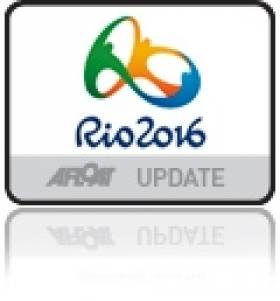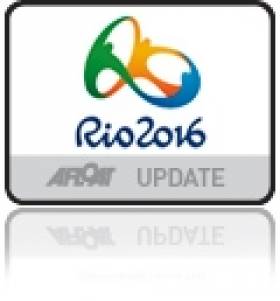Displaying items by tag: Robert Scheidt
Laser Man Espey Earns Personal Best in Oman as Scheidt Returns to the Top of World Fleet
#laser – Irish Laser London 2012 rep James Espey has taken a personal best of 31st overall at the Mens Laser worlds in Oman, an event that will be remembered for the return of Brazilian sailing legend Robert Scheidt to the top of world Laser sailing. Espey finished finished with his best race of the series in 12th to conclude his 2013 season, another step on the road to Rio 2016.
Scheidt was crowned 2013 Laser World Champion in Oman for the ninth time (and 18 years after his first victory) after winning the final race of the regatta then proclaimed this Laser World Championship title as his best so far.
The 40 year-old Brazilian sailor started the last race just one point ahead of rival Pavlos Kontides but put in a flawless performance to win by two boat lengths, raising the Brazilian flag as he crossed the line to a round of cheers and applause from spectators and other competitors.
"This feels more special than any of the other Laser Worlds I have won," said Scheidt, who returned to the Lasers after nine years in the Star class to compete at an Olympic Games in his home waters in Rio de Janeiro.
"I am at a different stage of my life – being a dad and being away from Laser sailing all these years makes it more special.
"I didn't know what to expect when I came back into the Lasers but winning the Worlds after a tough seven days means a lot.
"Rio is still a long way off and I shall have to see how my body holds up over the next few years but the next Olympic Games in Rio is definitely how I want to end my career."
Had there been no racing at Mussanah Beach, his one point lead overnight would have earned him the championship and with ten minutes to go before the 3pm cut off time, there was no sign of any racing due to the light and shifty breeze.
But at 2.56pm the start gun was fired and Scheidt, Kontides and third-placed Tonci Stipanovic from Croatia all made good starts
"I had a good start which was key," he explained
"Started in the middle and played the first shifts well which put me in the leading group at the top mark. I managed to get ahead and protected my position. It was a tense race because the breeze was very flukey going right and left and the race committee did well to wait for the breeze to stabilize. The moment we started we had the best breeze we'd had all day but it was still very shifty."
Kontides finished the race in 13th place to take the silver medal, trailing Scheidt by 13 points and while paying tribute to the Brazilian said he felt the odds were against him continuing to dominate in the way he had in Oman.
"He sailed a perfect race so well done to him," said the 23 year-old Cypriot who was completing his studies in Ship Science at the same time as preparing for the Worlds.
"But with some consistent training, I will be able to up my game and I know next season I will be much better. I am still learning and developing and Robert is at the peak of his game. Age wise he is 40 and at some stage will start to decline whereas I am 23 and on the up so the odds are against him.
"I decided the conditions were too tricky for any tactics – we have seen all week how the conditions demand proper sailing and a respect for the oscillating shifts so I thought the best thing to do was to do my best.
"I really wanted to taste the gold medal but I will be trying my hardest again next time."
Germany's Phillip Buhl won the bronze medal after finishing 10th in the final race which put him level on points with Rutger Schaardenburg from the Nederlands. Better results over the week gave him the advantage but it was bouncing back from being BFD in the final race on Friday that gave him most pleasure.
"I had a bad day on Friday so I'm very surprised to finish third," he said.
"I am not the best light winds sailor or at least I wasn't but I've improved and I am better now in all conditions. Having Robert Scheidt back in the fleet is good fun – beating him is more fun than beating anyone else and we can learn a lot from him. He really deserved to win here."
The prize-giving at the Al Mussanah Sports City where Scheidt, Kontides and Buhl were all presented with their medals, brought the curtain down on a tough but highly successful Laser World Championships, the first sailing championships to be hosted in Oman.
Scheidt Sounds Warning Signal to Rio Rivals at Laser Worlds in Oman
#laserworlds – Robert Scheidt sounded a warning to his Rio 2016 rivals today with an emphatic win at the 2013 Laser Standard World Championships in Oman, which moved him five places up the leaderboard into second place. Ireland's sole entry, James Espey lies 33rd overall.
Day 2 of the championships, which was also Oman's National Day, brought a change at the top after light winds at Mussanah Sports City caused postponements and frustration among competitors, resulting in ten disqualifications from four false starts in the only race of the day.
These included overnight leader Nick Thompson of Britain who dropped down to 34th place as well as former Laser World Champion Gustavo Lima from Portugal.
Croatian Tonci Stipanovic won his race in the Yellow fleet to take over the leader's yellow jersey while Pavlos Kontides from Cyprus maintained his consistent form to retain third overall. All three leaders are equal on 10 points each but Stipanovic's two outright wins in three races places him top.
Racing was postponed for three hours due to the breeze which was less than 5 knots when the first race was due to begin. But when the fleet finally got out onto the race course, the sea breeze had kicked in, remaining stable throughout a hot and sunny afternoon and building to around 13 knots.
Scheidt, eight times Laser World Champion, was delighted with his performance having led off the line and staying in front throughout. It confirmed that despite his nine year break from the Laser class and despite being 40 years old, he has a strong chance of qualifying for the Olympic Games on his home waters in Rio.
"To win a race at the Laser World Championships in this sort of breeze, you have to be fast and you have to be fit so I think I have my game back and I know it will be extremely hard but this makes me think I have a chance," he said.
"I had a good start, was clean off the line and managed to play the shifts well on the first upwind so was already in the lead at the first mark which made my life a lot easier.
"I managed to use my speed downwind and the second beat was more of a controlling race with the Croatian guy and the guy from Cyprus so I'm pretty happy. It is nice to win a race but the regatta has only just started."
The high number of disqualifications so early in the regatta was a result of frustration and the tricky conditions, Scheidt confirmed.
"It was a combination of people being aggressive and a little bit of current pushing them across the line – they didn't realize how close to the line they were which was why so many people got disqualified.
"It was tough to get a disqualification at the beginning of a regatta like that but I should think they will be a lot more careful from now on."
Thompson agreed he had taken a gamble that failed to pay off and was realistic about its implications.
"It was a close call but you couldn't call it bad luck or misfortune," admitted Thompson who has set his sights on winning the 2013 Laser World title, having missed out three times despite finishing on the podium.
"Of course I am disappointed because the black flag disqualification makes my life a lot harder from now."
Germany's Phillip Buhl staged a strong recovery after his disappointment of finishing 17th in Race 2 on Sunday with a third (yellow) in Race 3 but was frustrated when race officers cancelled the second race due the lack of time available.
"I am very happy with this result but I would have loved to have raced again because these are my favourite conditions and suit me well," he said.
He was lying second for most the race but fell to third just before the finish when Brazil's Bruno Fontes edged ahead with a surge of speed downwind.
"Hopefully in the long run it won't matter but the main thing was to be among the leaders because it was important for me to come back from finishing 17th on Sunday."
The qualifying races continue on Tuesday with two scheduled for each day until Wednesday. The finals series starts on Thursday with the last two showdowns set for Saturday.





























































